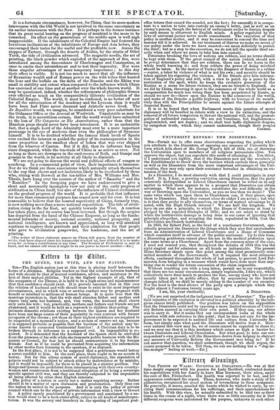UNIVERSITY REFORM: THE DISSENTERS.
Sin—Permit use to offer some observations respecting the policy which you attribute to the Dissenters, of opposing any measure of University Re- form which falls short of Mr. George Wood's bill of 1834. viz. of throwing the Universities open to members of all religious persuasions alike. You approve the object, but you reprobate this mode of obtaining it. You think, if I understand you rightly, that if the Dissenters now aid the members of the Establishment to throw down the barriers which exclude them generally as well as the Dissenters from the more important advantages of the Uni- versities, they may rely upon their assistance hereafter in obtaining an ex- tension of the boon.
As a Dissenter, I do most sincerely wish that I could participate in your belief. It is, I fear, a growing conviction among Dissenters, that the party commonly distinguished as Liberal Churchmen cannot be relied on in any matter in which there appears to be a prospect that Dissenters can obtain advantage. What no*, for instance, constitutes the real difficulty in the way of throwing open the Universities, as you no less than we desire ? The same votes which can open them to Churchmen can, if they please, open them to Dissenters. That they cannot alone do either I am aware ; but why is it that they prefer to ally themselves, on terms of mutual advantage be it noted, with the High Church interest ? We are half the kingdom. We have oh our side a principle, to which the House of Commons at least is pledged by the repeated triumphs of 1834; and we are asked to stand by while the irretrievable damage is being done to our cause of ignoring that principle altogether, and accepting the basis, repudiated in 1834, that the Universities are Church institutions.
In 1835, Sir Robert Peel, as the head of a reactionary Government, spe- cifically promised the Dissenters the things which they now find unattainable from an Administration of Liberal Churchmen and a House of Commons which considers itself in advance of the public sentiment. Up to this time, a Dissenting gentleman cannot place his son in the medical profession upon the same terms as a Churchman. Apart from the common sense of the case, I need not remind you, that throughout the debates of 1834 this was the right singled out for admission on all hands as indisputable. The present Home Secretary stands upon this point among the most prominently com- mitted members of the Government. Yet it required the most strenuous efforts, continued throughout the whole of last session, to prevent Lord Pal- merston from bringing in a measure which would have done more than any- thing else to render the future concession of the claim impossible. Without troubling you with a long letter, permit me to say respectfully, that there are too many circumstances, simply explainable, I dare say, which collectively have done much to produce the fear, among many who have not usually taken part in public affairs, that by acquiescing in the limited changes talked of, we shall be merely adding to the number of our enemies. Not the least is the dead silence of the party upon a principle which they fought almost a l'outrance twenty years ago.
I am, Sir, your obediently, A DISSENTER.
[We are not surprised at the indignant tone of " A Dissenter." The poli- tical injustice of the exclusion is elevated to a political absurdity by the reli- gious census lately published. Our position was taken on the supposition that the Dissenters could not by opposing a more limited measure of Univer- sity Reform succeed in carrying their own point. If they can, our advice was to carry it. But it seems that our correspondent looks at the whole question with sole reference to this point ; that he does not care for the im- provement to be expected to national life and culture from University Re- form, but simply asks what good the Dissenters will derive from it. How- ever natural this view may be, we of course cannot be expected to share it; and we may say that it is this tendency which raises so high a barrier be- tween Dissenters and Liberal Churchmen. But what good, to take our cor- respondent's own ground, will the Dissenters derive from helping to obstruct any measure of University Reform the Government may bring in ? If he can answer that question, we shall understand, though we shall regret, the course proposed to be taken. Till then, we can see nothing but a "dog-in- the-manger" feeling at work.—En.]


































 Previous page
Previous page